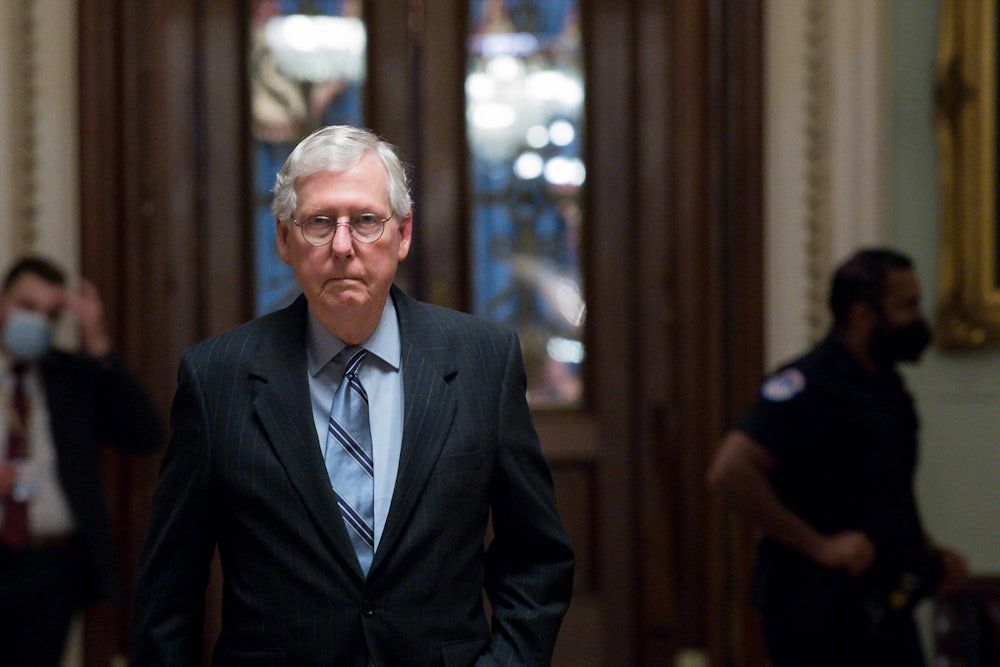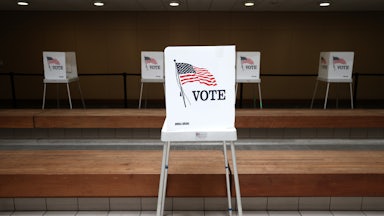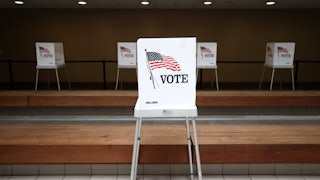Earlier this month, more than 150 companies signed an open letter calling on Congress “to restore the protections of the Voting Rights Act, removing barriers to voting and building the truly representative 21st century democracy our country deserves.” The letter endorsed the John Lewis Voting Rights Advancement Act, or H.R. 4, which would restore a key provision of the VRA that was gutted by the Supreme Court in the 2013 decision Shelby County v. Holder.
H.R. 4 may be approved in the House as early as this week, but likely will stall in the Senate, where it would need 10 Republican votes to advance. Only Republican Senator Lisa Murkowski of Alaska supports it. Minority Leader Mitch McConnell has called the bill “unnecessary,” a clear signal to his GOP colleagues not to join Murkowski and the Democrats.
“There’s no threat to the voting rights law,” he told reporters in June. “It’s against the law to discriminate in voting on the basis of race already.” While race-based discrimination is illegal, the preclearance requirement would allow a discriminatory policy to be rejected before it was enacted; without it, people must file litigation against new laws after they go into effect.
McConnell’s stance all but assures that H.R. 4 will die in the chamber he once led. And yet, new research shared exclusively with The New Republic by Accountable.US, a left-leaning advocacy group, shows that the political arms of 16 of the letter’s signatories—including Amazon, Facebook, Google, and Microsoft—have donated a total of $536,750 to McConnell’s campaign committees and leadership PACs.
Microsoft’s PAC has given the most to McConnell, totaling $126,000 in donations to his Senate committees and one of his leadership PACs since 1999. Google’s PAC has donated the second-highest amount, $79,000 since 2006, including $5,000 to the Bluegrass Committee in March this year. Facebook, Amazon, Cisco, Hewlett Packard, Intel, PepsiCo, and Target have all given $30,000 or more to McConnell. Most of these donations occurred before 2021, although some were given as recently as 2020.
The open letter by the companies did not specifically call out Republican-led states that have recently considered or enacted restrictive voting measures in the wake of former President Trump’s electoral loss. But it did argue that the 2020 election “highlighted deep inequities in how our elections are run” and said “impediments to exercising the right to vote persist in many states, especially for communities of color.”
“Congress needs to amend the Voting Rights Act to restore necessary safeguards by updating the Voting Rights Act’s coverage formula to prevent voting discrimination, as well as establish a more transparent and accountable system for states to report election law changes,” the letter said.
In a statement to The New Republic, Accountable.US president Kyle Herrig said, “If corporations truly value the right to vote, they can’t be complicit as the organizations and lawmakers they support try to deny this fundamental right to millions of Americans, particularly the disabled and communities of color.”
Research by Accountable.US also found that seven firms among the signatories are affiliated with the U.S. Chamber of Commerce, which opposed the Democrats’ For the People Act, a sweeping elections and campaign finance reform bill that was blocked in the Senate in June. However, an April letter by the chamber to senators urging them to vote against the bill also asked Congress to reform voting laws, suggesting the creation of a bipartisan national commission to “make recommendations for improving our election system”—an indication that the chamber’s problem was not with the voting reforms in the bill, but with its provisions related to campaign finance.
“Public declarations of support for federal voter protections mean nothing when corporations undermine those sentiments by failing to hold lawmakers and groups like the U.S. Chamber of Commerce accountable for promoting voter suppression,” Herrig said. “If corporations and their PACs continue to back those more interested in perpetuating Trump’s Big Lie, they owe their employees, shareholders, consumers, and communities an explanation why they are not being honest and consistent in their values.”
Some companies have come under fire in recent months for donating to Republican politicians who voted against certifying President Biden’s Electoral College victories, with Toyota promising in July that it would stop contributing to them. But other companies that pledged to avoid donating to any lawmaker who voted against certification in the immediate aftermath of the January 6 attack on the Capitol have nonetheless resumed giving cash to PACs that benefit the reelection efforts of these members of Congress.
Republicans have also complained about apparent acts of political activism from corporations. In April, McConnell himself warned CEOs against becoming involved in divisive political issues, after corporate leaders condemned a controversial voting law in Georgia and Major League Baseball pulled this year’s All-Star Game out of the state.
“My warning, if you will, to corporate America is to stay out of politics,” McConnell said. However, he later clarified that he was “not talking about political contributions.”
“Most of them contribute to both sides, they have political action committees, that’s fine. It’s legal, it’s appropriate, I support that. I’m talking about taking a position on a highly incendiary issue like this and punishing a community or a state because you don’t like a particular law that passed, I just think it’s stupid,” McConnell said.








